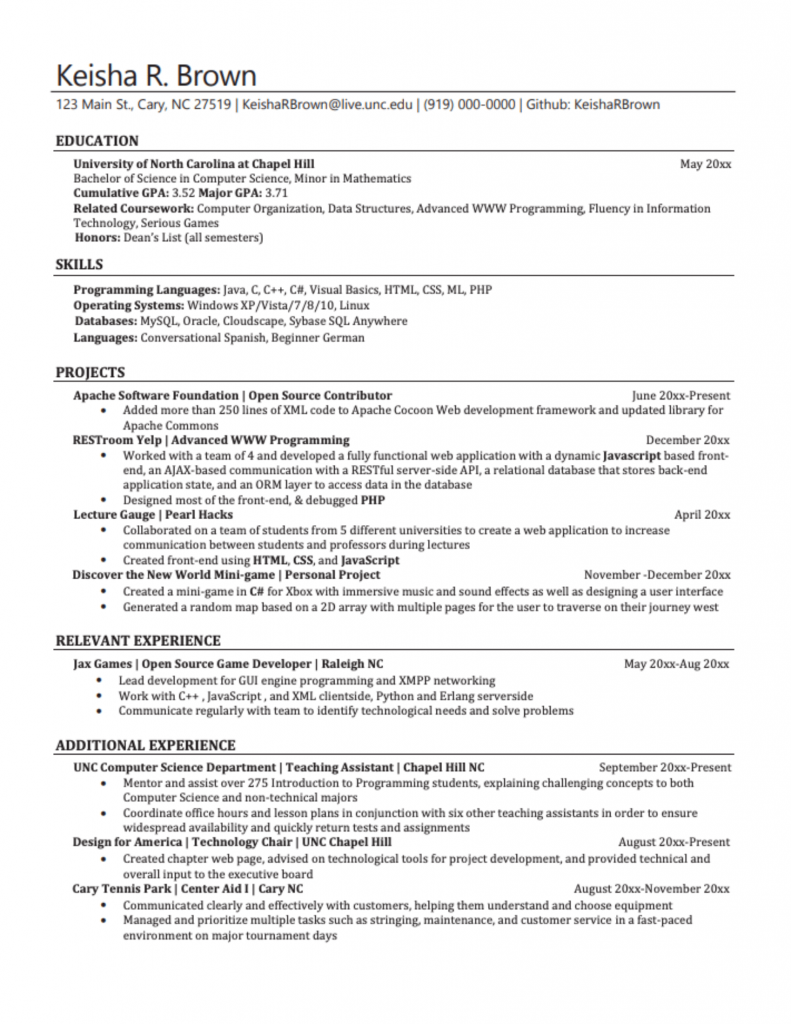1. Choosing a template
It does not matter how long your resume is, as long as the content matches the job description requirements. Unless the page count is specified on a job description (in case someone still prints these resumes for review) it is better to make your resume easily readable, and use more space, rather than cram a lot of content on one page and make it harder for the reader’s eye to navigate. However, making a resume too long could make it harder to "review at a glance". If the resume is multiple pages long, use a footer to include “your name/page number” (in case someone prints it).
3. Content
- Education
- Work Experience
- Skills
Depending on your experiences it can also include:
- Projects
- Awards
- Volunteering
You can also add Github or some other developer profiles that highlights your proficiency.
It is a good practice, though not necessary, to include a headline outlining your specialty i.e. machine learning engineer, security engineer, etc.
Do not forget to include email address or other contact information.
3. Work experience
4. Projects section
It is a big bonus if you have done internships. If you are still a student and do not have much real world coding experience, I would recommend applying for internships asap, and way before you decide to go for a full-time job.
5. Awards section
In addition, Include financial prizes and awards for your contributions to your field.
Including any awards received before college or any beginner awards in the first years of college, comes across as vain. Unless you are Gennady Korotkevich and got first place at ACM ICPC as a freshman, it does not matter. Furthermore, it can do more harm than good, since it reads as if you have not done much so you are including everything that comes to your mind.
6. Programming skills
Volunteer section is not necessary unless the volunteering jobs helped you gain any experience related to the job you are looking for.
Finally, give your resume to a person who does not know you in a professional capacity to look at it for a few seconds, then ask them what they think you are good at. Edit your resume up until their answer matches what you want them to convey.
Building resume
While you can always aspire to make your resume more and more impressive as time goes, don’t ever fake your credentials and do not exaggerate to the point of lying or misleading interviewers. Instead put more effort and work into actually obtaining the credentials you desire. Lying on a resume can seriously damage your career.
For example: if you worked on a project that has not been completed yet, you can include that you are working on the project, but do not say it has been completed and you have made amazing achievements. If you have worked on some technology or programming language for a while but it's been years since then, you can still include it. However, when I asked during the interview be honest about your proficiency. Do no include skills you have never had or have any experiences with, just because it is part of the requirements for a job posting. First do the work to get familiar with it and then apply for the position.
Internships are a really good way of obtaining relevant experience for future roles. Tech internships are always paid and on average 2-3 months long. Make sure the internship does include the type of work you want to do in the future. For example if a company hires interns only as a tester or quality assurance type of work, it is not so helpful for your future back-end engineer career. Reject these opportunities and do not get side-tracked. Focus on the roles that are directly honing the skills you need. A small project related to your future job is more helpful than a huge project with a great impact in meteorology.
Examples of readable and simple resumes from the web:
 |
| Source link |
 |
| Source link |
Finally this is a version of my resume, that includes all the information I might consider worth mentioning in an application. Based on the positions I am applying for I often remove some of the content to make it simpler and easier to read.



Comments
Post a Comment